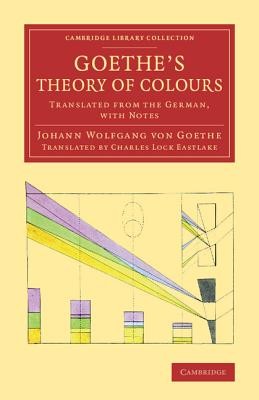
- We will send in 10–14 business days.
- Author: Johann Wolfgang von Goethe
- Publisher: Cambridge University Press
- ISBN-10: 1108075444
- ISBN-13: 9781108075442
- Format: 14 x 21.3 x 3.3 cm, minkšti viršeliai
- Language: English
- SAVE -10% with code: EXTRA
Reviews
Description
This work by Johann Wolfgang von Goethe (1749-1832) was translated into English in 1840 by Sir Charles Eastlake (1793-1865), painter and later keeper of the National Gallery. Goethe's 1810 work was rejected by many contemporary scientists because it appeared to contradict the physical laws laid down by Newton. However, its focus on the human perception of the colour spectrum, as opposed to the observable optical phenomenon, was attractive to, and influential upon, artists and philosophers. As Eastlake says in his preface, the work's dismissal on scientific grounds had caused 'a well-arranged mass of observations and experiments, many of which are important and interesting', to be overlooked. Eastlake also puts Goethe's work into its aesthetic and scientific context and describes its original reception. His clear translation of Goethe's observations and experiments on colour and light will appeal to anyone interested in our responses to art.
EXTRA 10 % discount with code: EXTRA
The promotion ends in 22d.05:36:19
The discount code is valid when purchasing from 10 €. Discounts do not stack.
- Author: Johann Wolfgang von Goethe
- Publisher: Cambridge University Press
- ISBN-10: 1108075444
- ISBN-13: 9781108075442
- Format: 14 x 21.3 x 3.3 cm, minkšti viršeliai
- Language: English English
This work by Johann Wolfgang von Goethe (1749-1832) was translated into English in 1840 by Sir Charles Eastlake (1793-1865), painter and later keeper of the National Gallery. Goethe's 1810 work was rejected by many contemporary scientists because it appeared to contradict the physical laws laid down by Newton. However, its focus on the human perception of the colour spectrum, as opposed to the observable optical phenomenon, was attractive to, and influential upon, artists and philosophers. As Eastlake says in his preface, the work's dismissal on scientific grounds had caused 'a well-arranged mass of observations and experiments, many of which are important and interesting', to be overlooked. Eastlake also puts Goethe's work into its aesthetic and scientific context and describes its original reception. His clear translation of Goethe's observations and experiments on colour and light will appeal to anyone interested in our responses to art.


Reviews